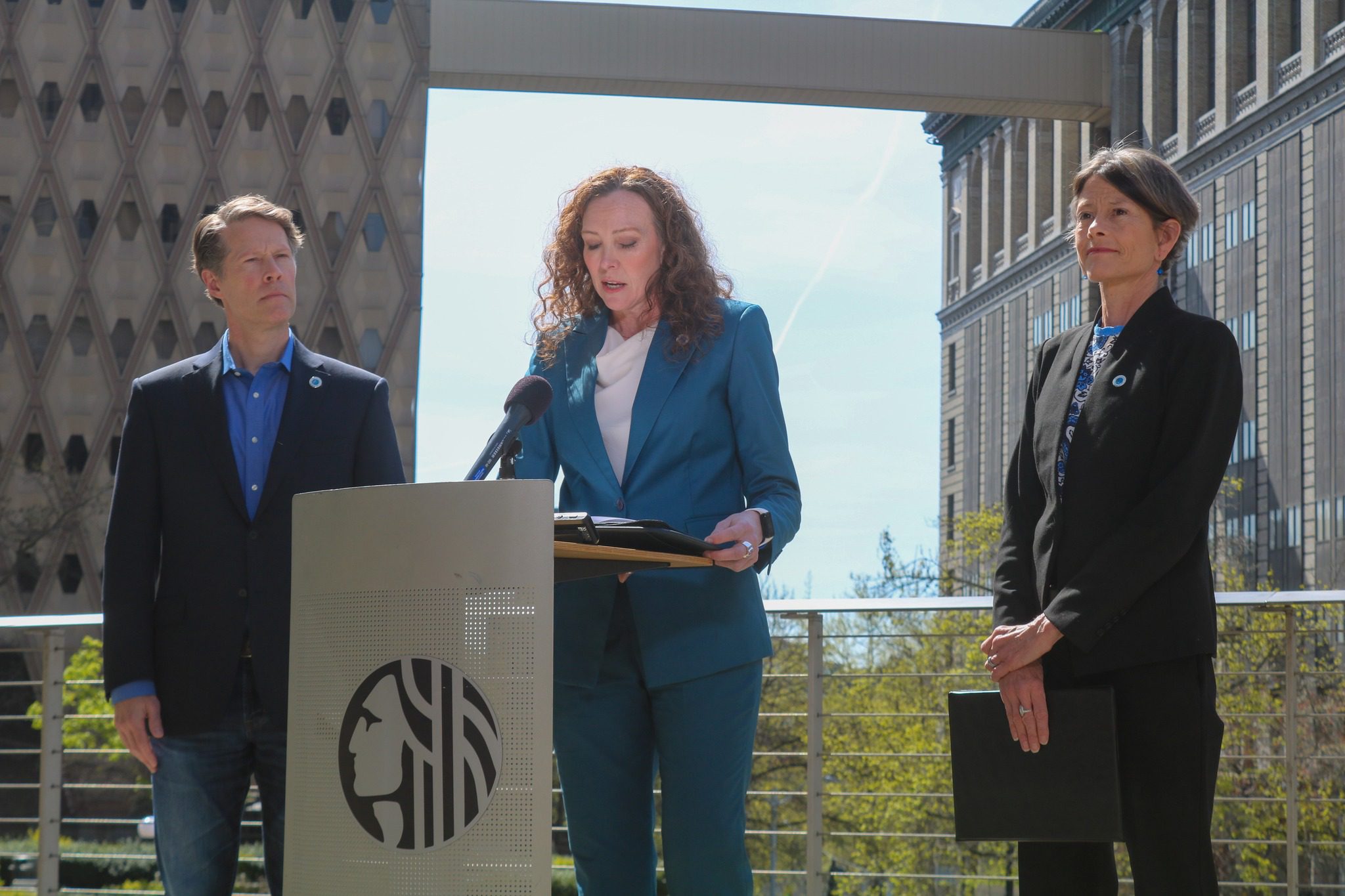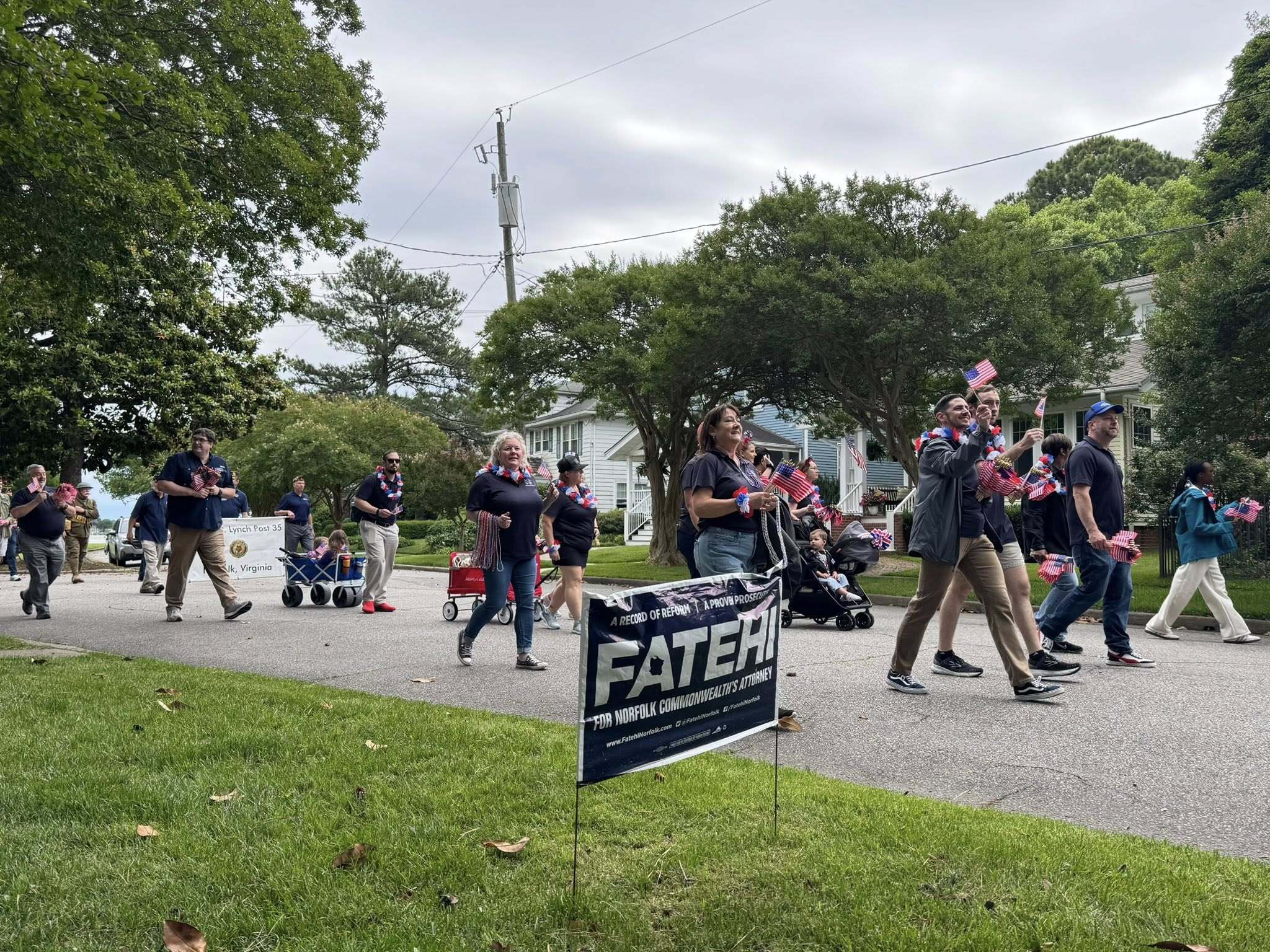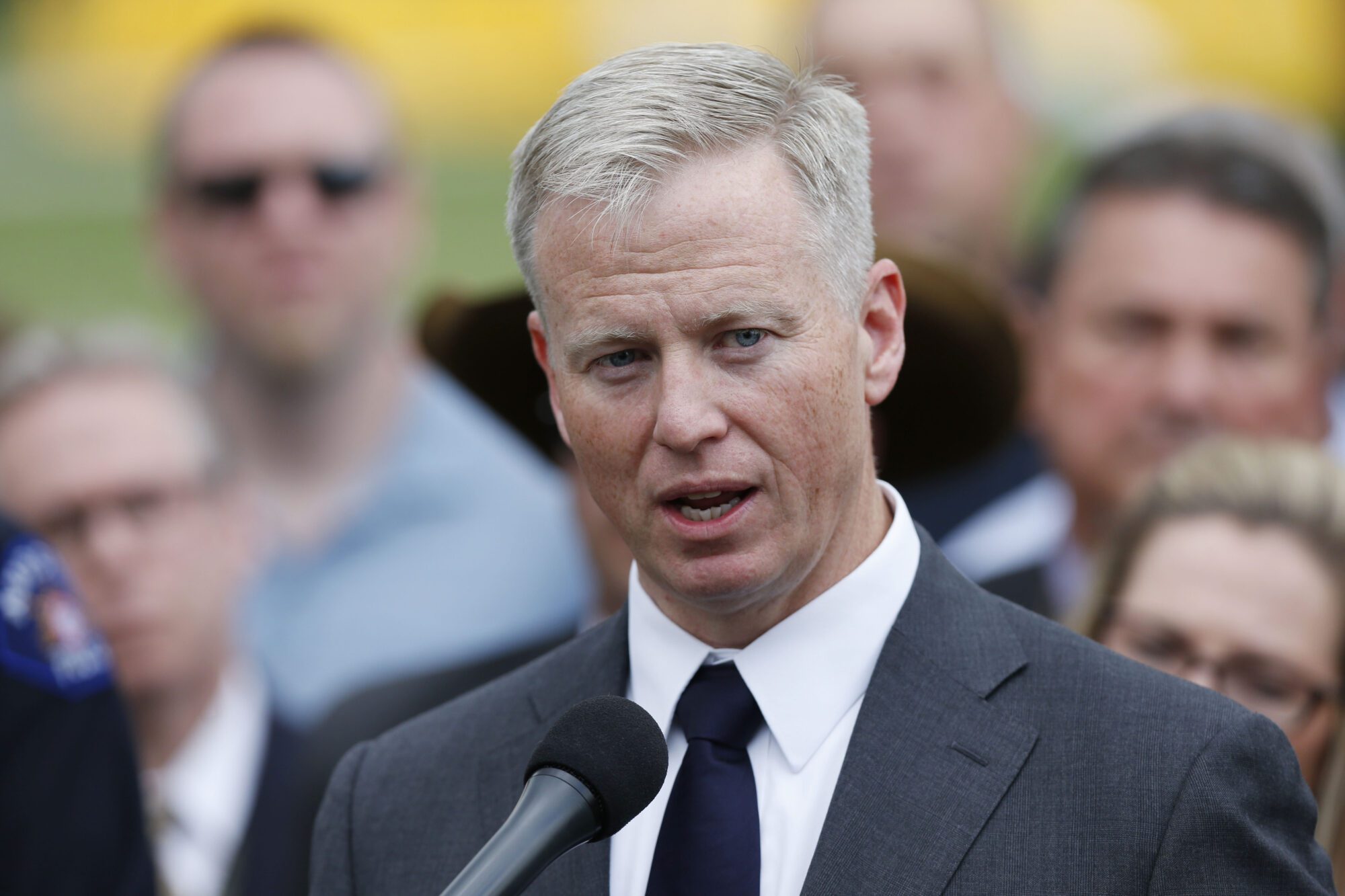Your Guide to the 2025 Prosecutor Elections
Key races will shape the politics of criminal justice from Philly to Seattle—plus a wild card in New Jersey. But most of November’s 66 prosecutor races feature just one candidate, as usual.
| August 21, 2025
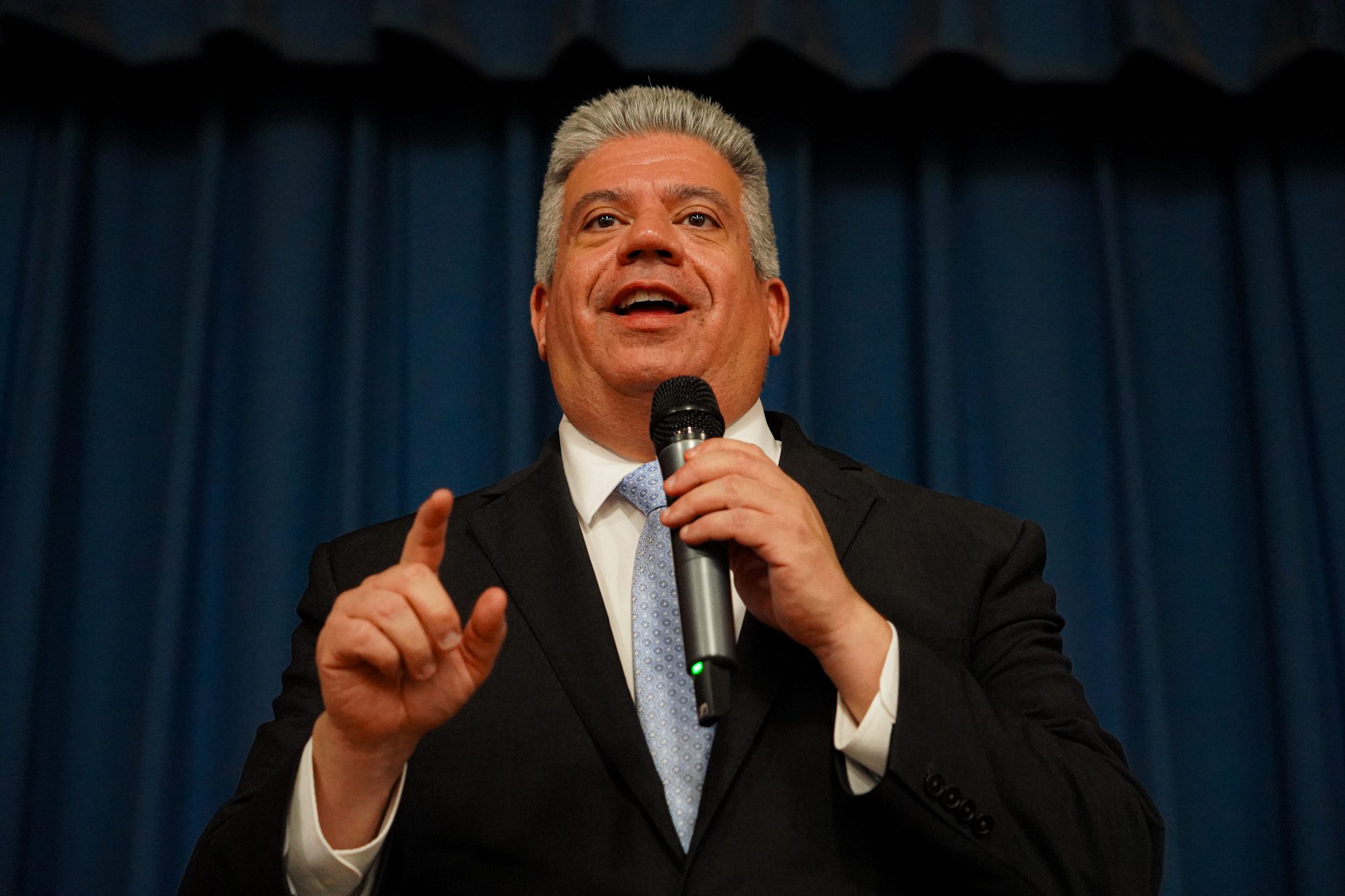
Howard Gwynn served more than three decades as prosecutor of Newport News, Virginia, but never faced any opponent over his eight reelection races. This summer, on his ninth reelection bid, he drew his first challenger, Shannon Jones, and lost to her by 15 percentage points in the Democratic primary.
Jones chose to run “because this is a city that had gone 35 years without a contested election.” But she now benefits from a similar dynamic heading into November’s general election, in which she faces no opponent, virtually ensuring that she’ll enter the office come 2026.
A former prosecutor involved with her local NAACP chapter, Jones says she identifies with the “progressive prosecutor” movement and hopes to show that focusing on public safety goes hand in hand with promoting civil rights. She told Bolts she wants fewer people to receive felony-level convictions for drug use, for instance, and intends instead to “put resources in place to help get folks back on track” and break cycles of criminal behavior.
“We’re just prosecuting cases arbitrarily without understanding the implications of addiction,” she said. “Those are going to be hurdles that people are going to have to overcome for life.”
Prosecutors have a great deal of discretion over how people are charged and sentenced; their policies shape their local court systems and the rates at which people end up in prison. That means that prosecutor races can be crossroads for local criminal justice policy, depending on who’s running and whether they’re proposing to shift the status quo.
Dozens of these races are unfolding even in the off-year of 2025; they’re largely concentrated in New York, Pennsylvania, and Virginia. Many drew just one candidate, or, like in Newport News, they were already resolved this spring in a party primary. But some contested races remain and will be decided on Nov. 4 in a general election.
With November fast approaching, Bolts today delves into the still-unresolved prosecutors’ races that feature some policy stakes.
To that end, Bolts reached out to all of the non-incumbent candidates in counties or cities of at least 80,000 residents, requesting an interview to learn about how they’d approach their new office if they were elected. Some of the candidates who replied relished getting to discuss their views, however most did not answer at all, echoing a broader silence about policy views on their campaign websites and other public materials.
Elections of note include Philadelphia, Seattle, Manhattan and Nassau County in New York, and the most populous cities in Virginia’s Hamptons Road region.
So far, in the 2025 primaries, reform prosecutors have held their own and are favored to keep the offices they already held, if not slightly expand their ranks—a turnaround from the progressive losses in California last year. Philadelphia’s Larry Krasner and Manhattan’s Alvin Bragg beat primary challengers who campaigned on cracking down on crime more aggressively, though each now faces a general election with the same script. In Norfolk, Virginia, reform prosecutor Ramon Fatehi survived a tough primary; he is now running unopposed and set to gain an ally in neighboring Newport News. Seattleites seem likely to oust their punitive city attorney come the fall.
Despite several headline races, Bolts analysis continues to show how rarely elected prosecutors face any contestation at all—a trend Bolts has covered for years, which neither the rise of “progressive prosecutors” nor any pushback has changed.
Of the 66 prosecutor races Bolts has identified this year, only 15 feature multiple candidates in November.
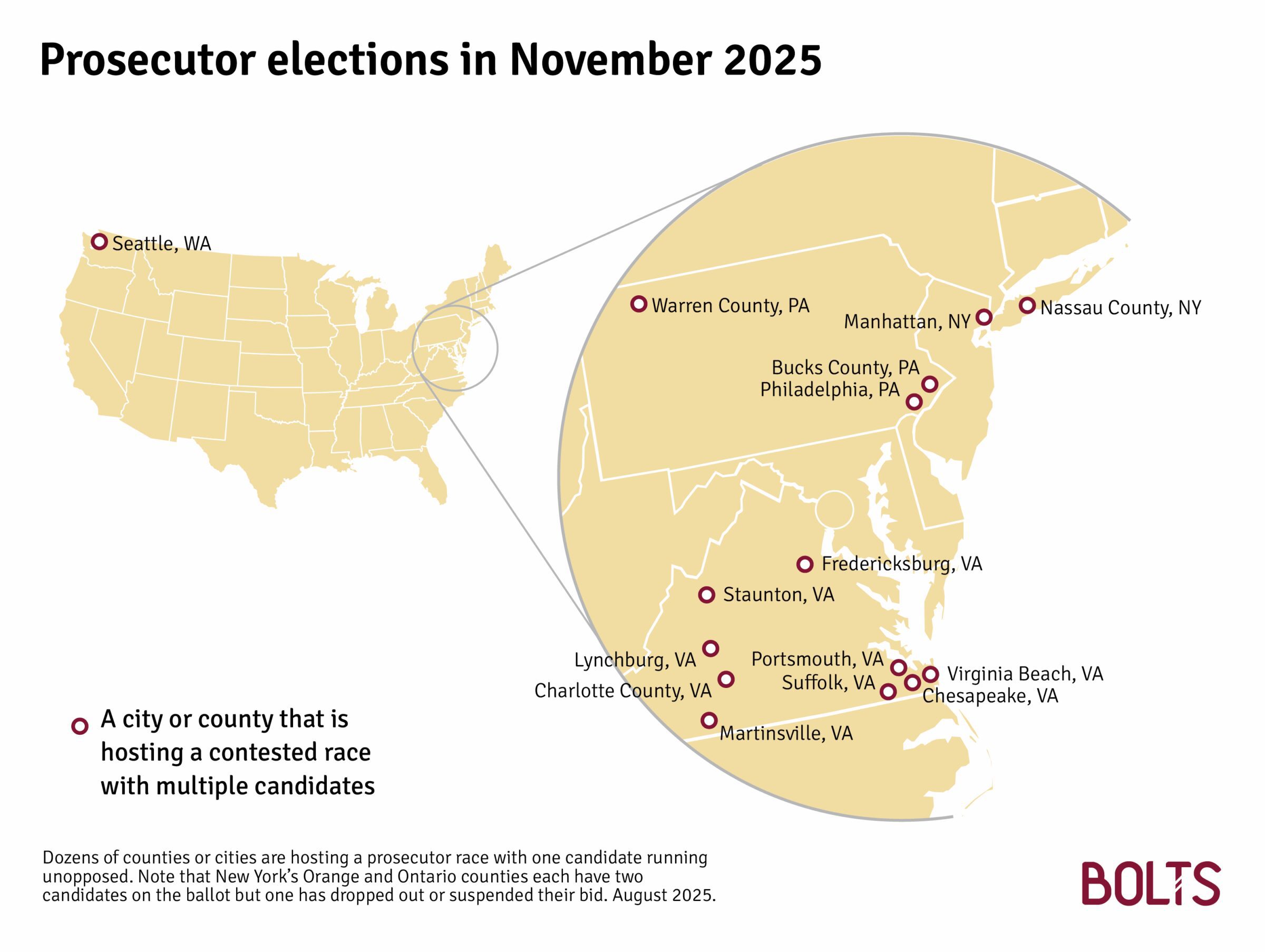
Throw in the primaries, and the number inches up, but not by much: Out of the 66 races, just 22 have featured some competition in either a primary or the general election.
That means that, in two-thirds of this year’s prosecutor races, an election was over as soon as the filing deadline passed, with virtually no chance for voters to weigh in on local practices.
Below, you can explore our analysis of key prosecutor races state-by-state—in New York, Pennsylvania, Virginia, Washington, plus Louisiana and Mississippi, which are holding two special elections. Plus, you’ll find an added discussion of county prosecutors in New Jersey, who are not locally elected but rather appointed by the state’s governor, whom voters will also pick in November’s elections.
You can also explore Bolts’ compilation of all of this year’s prosecutor races and candidates.
In New York, can reform critics make Manhattan competitive?
Bragg, Manhattan’s Democratic DA who drew national attention for bringing Trump to trial last year, is a frequent punching bag of conservatives over his perceived alignment with criminal justice reformers. Last year, an Arizona prosecutor even said she’d refuse to extradite a suspect to New York over what she characterizes as Bragg’s lenient policies.
His two challengers this fall, GOP nominee Maud Maron and independent candidate Diana Florence, are carrying that view into the DA race. Both say they feel the city is not safe, though shootings and murders are at a record low this year. And both center their attacks on a memo Bragg issued early in his tenure to reduce jail time and curtail life sentences; it also said he wouldn’t prosecute certain low-level offenses. (Bragg has since rolled back parts of that memo.)
Florence told Bolts in an interview she intends to repeal Bragg’s memo, which would ramp up prosecution of so-called quality of life offenses. “If there are laws, we follow them; we don’t give blanket policies so that we telegraph that the laws don’t matter,” she told Bolts. “All of us who follow the rule, who paid our fares on the subway, who want to buy toothpaste without taking 20 minutes, we’re all paying the consequences. It’s little annoyances and little pieces of unfairness that foments people’s bitterness, and I don’t want to live in a place where people think that other people are getting a better deal.”
A former prosecutor in the Manhattan DA’s office, Florence quit in 2020 following allegations that she had failed to disclose evidence.
Maron, meanwhile, made a mark last year as a right-wing activist on a Manhattan parents council, where she championed proposals to exclude trans students from bathrooms and sports that match their gender. Her campaign did not return a request for comment; in a recent article, Maron detailed a suite of common “anti-woke” complaints (from “endless bike lanes” to “composting mandates”) to explain why she believes New York is in disarray and needs a different kind of law and order.
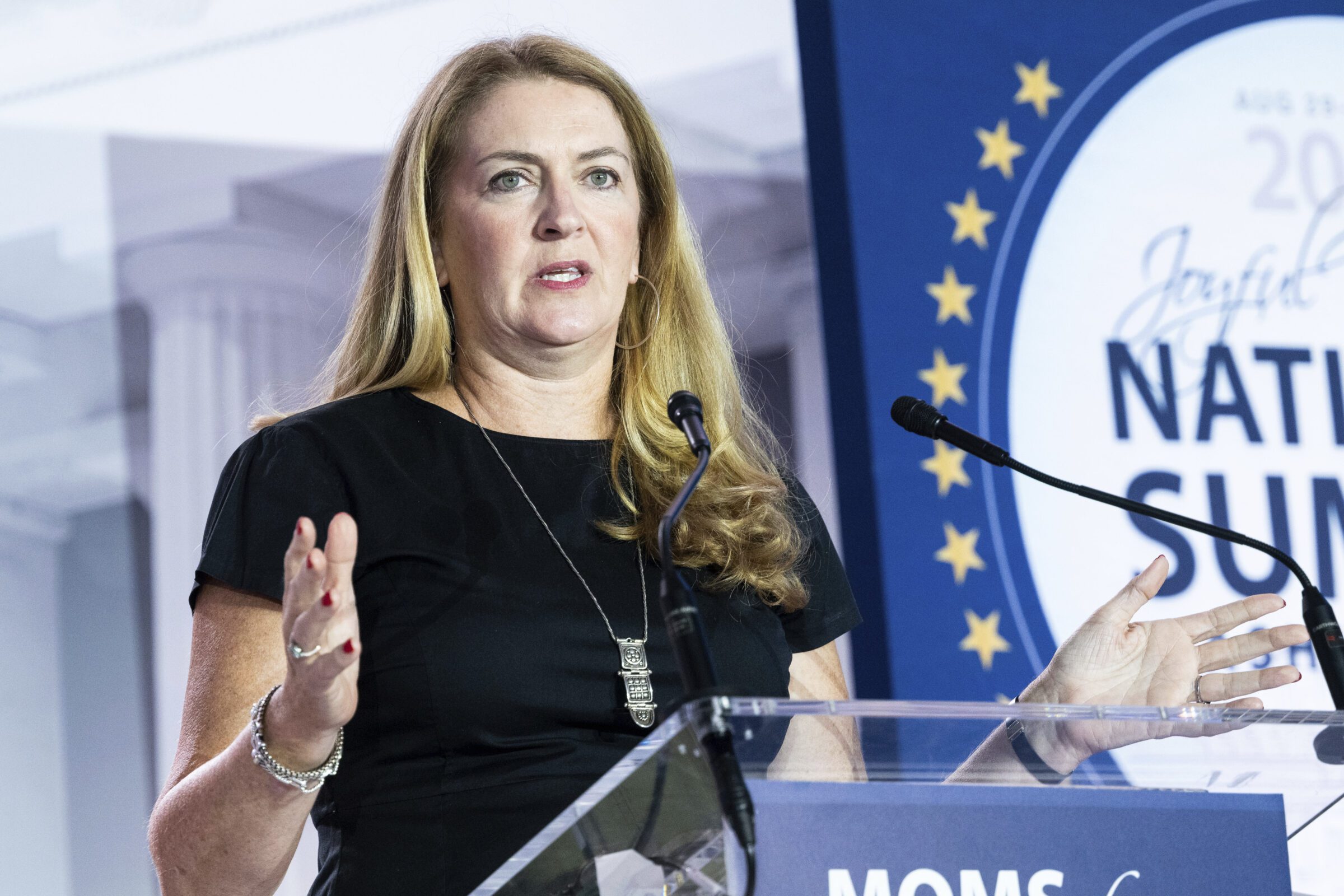
Bragg, who easily defeated a primary opponent who also criticized criminal justice reforms in June, is favored to win again in November in the blue bastion of Manhattan.
In neighboring Nassau County, a populous suburban county on Long Island, Republican DA Anne Donnelly is seeking a second term against Democrat Nicole Aloise, a career prosecutor.
Trump last year became the first Republican presidential candidate to carry this county since the 1980s, but the shift followed other GOP gains: Donnelly flipped the DA’s office in 2021 after relentlessly attacking her Democratic opponent over the state’s bail reform, and she’s using a similar script this year. Aloise, meanwhile, has focused on Donnelly’s leadership style, and her website vows she’ll be “tough on crime” (her campaign did not reply to interview requests).
None of New York’s 16 other DA races are contested this fall.
That includes Kings County (Brooklyn) and Long Island’s Suffolk County, two of the nation’s most populous counties, where Democratic DA Eric Gonzalez and Republican DA Raymond Tierney are running unopposed. (Neither faced a primary challenger, either.)
Central New York was set to host an intriguing showdown between Orange County’s Republican DA David Hoovler, a prominent critic of New York’s criminal justice reforms, and Democrat Alan Joseph, but Joseph told Bolts that he has had to suspend his campaign over health issues.
Explore New York’s full list of candidates, including in counties with a single contender.
Two Krasner rivals mount separate DA bids in Pennsylvania
Unopposed prosecutors are, once again, the undisputed winners in Pennsylvania: In 14 of the 17 counties with DA races, there’ll be just one candidate on the general election ballot.
That number was almost going to be 15: When Larry Krasner defeated Pat Dugan, a former judge, in Philadelphia’s Democratic primary in May, it looked like he’d have no November foe. The GOP, bereft of any candidate, had tried to recruit Dugan but he had ruled out running as a Republican.
But then Dugan changed his mind earlier this month, announcing he’d challenge Krasner as the GOP nominee after all.
Dugan, who did not respond to requests for an interview, is keeping up the same message that Democratic primary voters rejected in the spring—that Krasner has been too lenient, particularly in retail theft prosecutions, whereas he, Dugan, was “actually going to prosecute crime.” Meanwhile, Krasner’s allies have touted his reforms for lessening the footprint of the court system, including by slashing the number of people living under probation and by downgrading sentences for lower-level offenses.
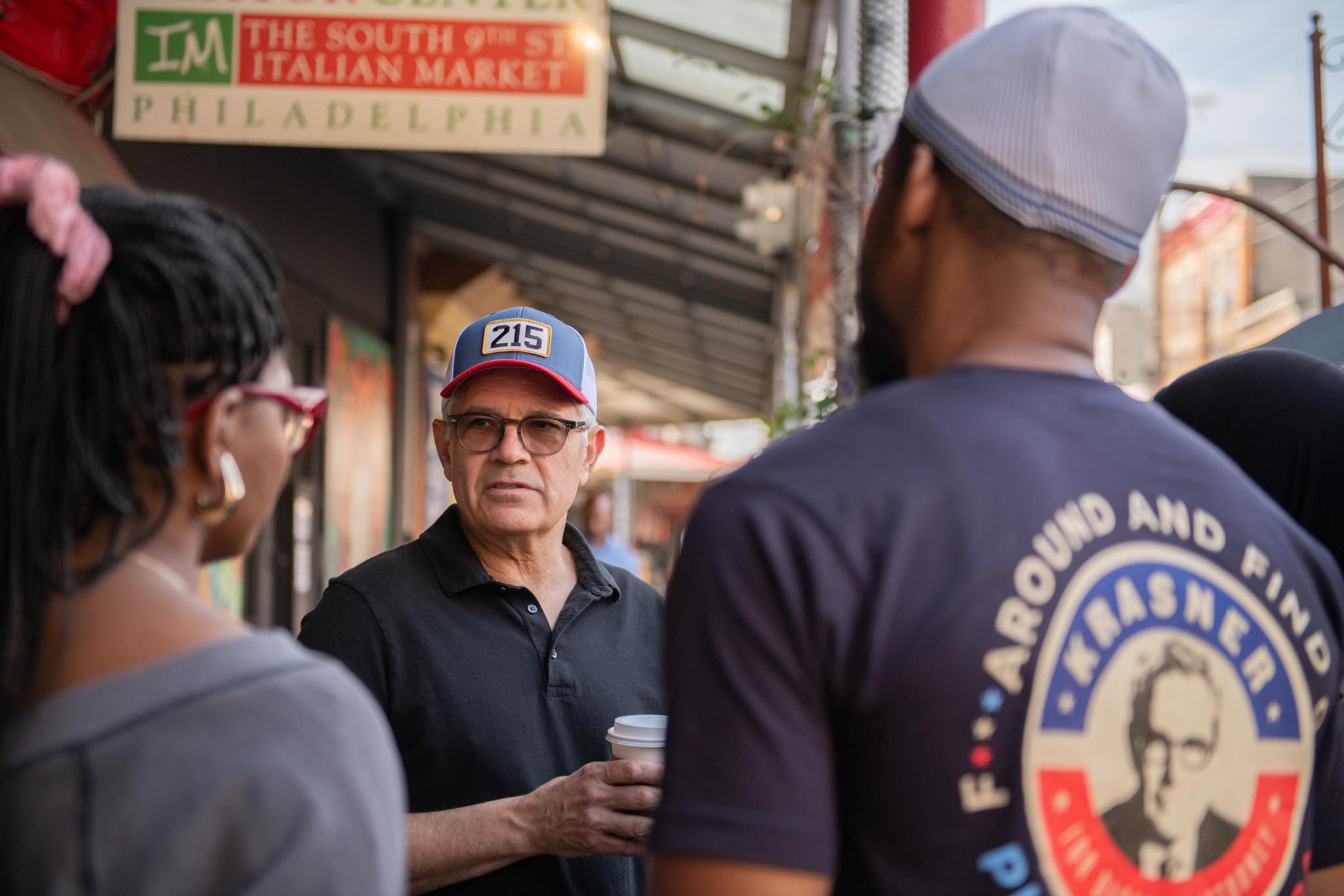
Philadelphia is a staunchly Democratic city, making even a general election race an uphill climb for Dugan. But the former judge hopes to retain his primary supporters and combine them with GOP voters. And there’s still the possibility that Elon Musk, who threatened to target Krasner this year but then stayed out of the Democratic primary, could intervene financially.
Curiously, a DA race in a neighboring county features another former rival of Krasner’s.
Joe Khan, a former local and federal prosecutor, lost to Krasner in the Democratic primary for Philadelphia DA eight years ago. He then moved to Bucks County, where he worked as the county solicitor and last year he ran unsuccessfully for state attorney general. Now he is challenging Bucks County’s Republican DA, Jennifer Shorn.
Back when he was running for Philly’s DA in 2017, Khan cast himself as interested in ambitious criminal justice reforms. This year, facing attacks from the right as he runs in the suburbs, he has pointed to the fact that he once ran against Krasner as a sign he wouldn’t govern like his former opponent. Khan’s campaign, which does not have a website as of publication, declined an interview request for this story after Bolts refused to limit the topics of the interview to issues the campaign wanted to discuss, which included Khan’s current priorities of consumer and labor protections.
Pennsylvania’s final contested DA race is in the state’s northwest corner, in sparsely populated Warren County, a red county where GOP nominee Cody Brown, a longtime assistant DA, is favored to take over as chief prosecutor.
Explore Pennsylvania’s full list of candidates, including in the counties with a single contender.
Competition forms across Virginia’s Hampton Roads region
Virginia’s two largest cities will host the only two prosecutor races in the state with Democratic and GOP nominees facing off, out of the 26 DA elections on the ballot this fall.
Virginia Beach’s GOP incumbent, Colin Stolle, faces Democrat Susanne Richmond, a former prosecutor and public defender.
In an interview with Bolts, Richmond says she’s disturbed by the absence of so-called specialty dockets in the city; these are programs that connect people with substance use or mental health issues to services as an alternative to incarceration. In light of Virginia Beach’s large military population, she takes issue with the lack of a docket specific to veterans, which some other Virginia cities have created. “Virginia Beach is behind in terms of reform,” she told Bolts.
But Richmond also rejects the policies that so-called progressive prosecutors like Fatehi and Jones have proposed to intentionally sidestep mandatory minimums and reduce felony-level convictions. She says these policies usurp the role of lawmakers, and that prosecutors should just “enforce the law.” Richmond also said she is staunchly opposed to ICE’s actions under the Trump administration; if elected, she said, she’d advocate that lawmakers ban ICE agents from operating while masked or while concealing their identities and she’d then want to prosecute them if they do.
In the neighboring city of Chesapeake, incumbent Matt Hamel left the Republican Party last fall, accusing local GOP leaders of pressuring him in exchange for financial donations. Now he is running as a Democrat and will face Republican David Mick.
Mick told Bolts that he’s a conservative who opposes many proposals put forth by Virginia reformers, for instance restricting cash bail or mandatory minimums. But he also stressed his past experience as a public defender and defense attorney, which he says taught him to prioritize respecting defendants’ rights. He criticizes Hamel on this issue, pointing to recent allegations that Chesapeake prosecutors withheld exculpatory material in a murder case. He says he has worked on releasing innocent people, telling Bolts, “One way to prevent that from ever happening is to have proper prosecutors on the front end that do things the right way, that turn over all exculpatory evidence, that make sure defendants get a fair shake at trial.”
Hamel and Stolle, the incumbents, did not reply to requests for comment for this story.
Virginia Beach and Chesapeake are part of Hamptons Road, a southeast Virginia region that also includes Norfolk and Newport News, where Fatehi and Jones are now running unopposed. Fatehi is part of the Virginia Progressives for Justice, a coalition launched in 2020 whose members have lobbied lawmakers on reform legislation. Jones told Bolts she wants to be part of the group and push changes like ending mandatory minimums; neither Mick nor Richmond did.
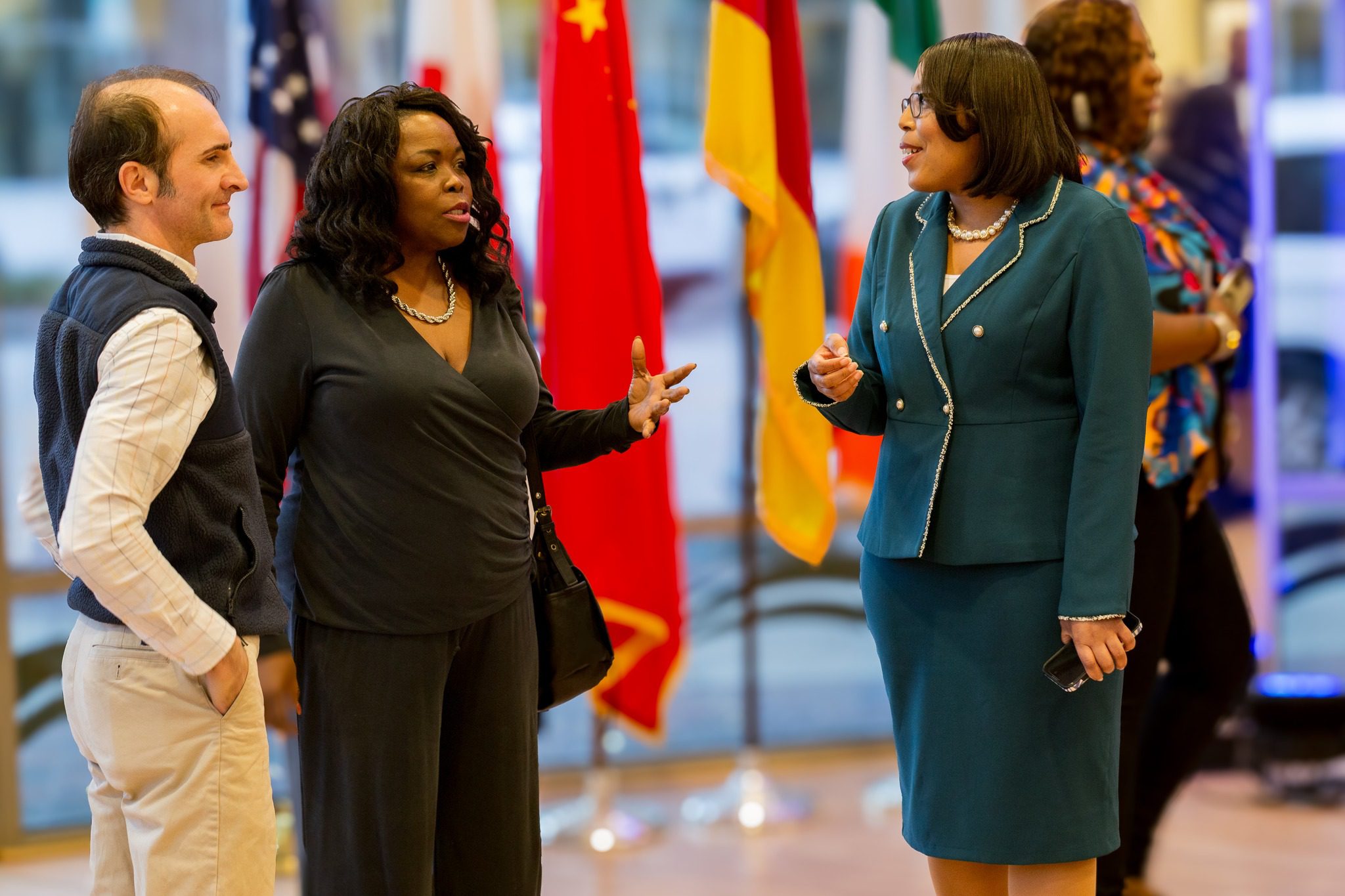
Another Hamptons Road prosecutor who played a leading role in the creation of that coalition in 2020, Portsmouth’s Stephanie Morales, is up for reelection this fall. She faces two independent opponents, Nathan Chapman and Stephen Heretick, who did not reply to interview requests.
Several Virginia jurisdictions, mostly under 30,000 residents, are also hosting contested races, but 17 prosecutor elections feature only one general election candidate running unopposed.
Explore Virginia’s full list of candidates, including in the cities with a single contender.
In Washington, Seattle may shift back toward progressives
Ann Davison, Seattle’s Republican city attorney, finished well behind challenger Erika Evans in the August primary, 56 to 33 percent. As the top two, they both advanced to the general election and will face off again in November.
The city attorney’s office handles misdemeanor-level prosecution, and Davison has championed harsher punishments for low-level offenses during her tenure, Bolts reported in July. Evans, meanwhile, says she’ll take a more progressive direction.
Evans wants to undo a policy championed by Davison to ban some people charged with drug offenses from entering designated zones throughout the city. Evans called the idea “harmful and ineffective and racist” in an interview with Bolts. She also said she’ll reopen Seattle’s community court, which connected defendants to services without requiring that they first plead guilty—a program that Davison unilaterally shut down in 2023.
There are only two other prosecutorial races in Washington: Lincoln and Ferry counties are each hosting a special election for their top prosecutor job, with each race featuring just one candidate running unopposed (interim prosecuting attorneys Ty Albertson and Michael Golden, respectively).
Special elections in Louisiana and Mississippi
Each of these southern states is holding just one special election for DA, neither of which looks to be contested at the moment. In Louisiana, Republican Mike Haik took over as DA of Iberia, St. Martin, and St. Mary’s parishes earlier this year, and he’s now running for a full term unopposed. Jason Herring took over as DA of Mississippi’s first judicial district last winter, and is now seeking a full term; the filing deadline for that race isn’t until next month.
In New Jersey, governor as chief prosecutor
New Jersey voters do not elect their county prosecutors, unlike in 45 other states; instead, the governor selects them. The governor also selects the state’s attorney general, who can issue directives that bind local law enforcement, including prosecutor’s offices.
That means that the state’s next governor will have opportunities to directly shape local prosecution policy.
Jack Ciattarelli, the GOP nominee for governor this fall, has said he wants to flex that power to secure more punitive outcomes, promising to appoint “conservative state judges and county prosecutors” who’ll ramp up pretrial detention. While crime in New Jersey is lower than four years ago, when Ciattarelli first ran for governor, his campaign has portrayed the state as rife with danger and blamed immigrants and the bipartisan bail reform passed a decade ago, which he has said he wants to scrap.
Ciattarelli’s campaign didn’t answer questions Bolts sent for this story. Spokespeople for Democratic nominee Mikie Sherrill, a member of Congress and former federal prosecutor, also did not respond to Bolts’ questions. Sherrill has generally kept to the center on policing issues compared to her primary rivals, and she does not address prosecutors on her campaign website, beyond offering general support for law enforcement.
Amol Sinha, executive director of the ACLU of New Jersey, told Bolts he’s pleased that New Jersey has significantly reduced incarceration under the state’s current governor, but says he wants to see more reforms from the next governor; his organization has teamed up with other groups to demand more changes, like increasing pretrial diversion.
“One of the most important decisions a New Jersey governor makes is appointing the attorney general and the 21 county prosecutors,” Sinha said. As the next governor announces their choices, he added, advocates will be keeping on eye on questions like: “Who is going to work to reduce racial disparities in charging and sentencing decisions? Who is committing to transparency and community engagement? Who is going to take steps to make sure that we continue to reduce the prison population in New Jersey? Who is going to make sure that we’re not unnecessarily waiving kids into adult proceedings?”
Sign up and stay up-to-date
Support us
Bolts is a non-profit newsroom that relies on donations, and it takes resources to produce this work. If you appreciate our value, become a monthly donor or make a contribution.


